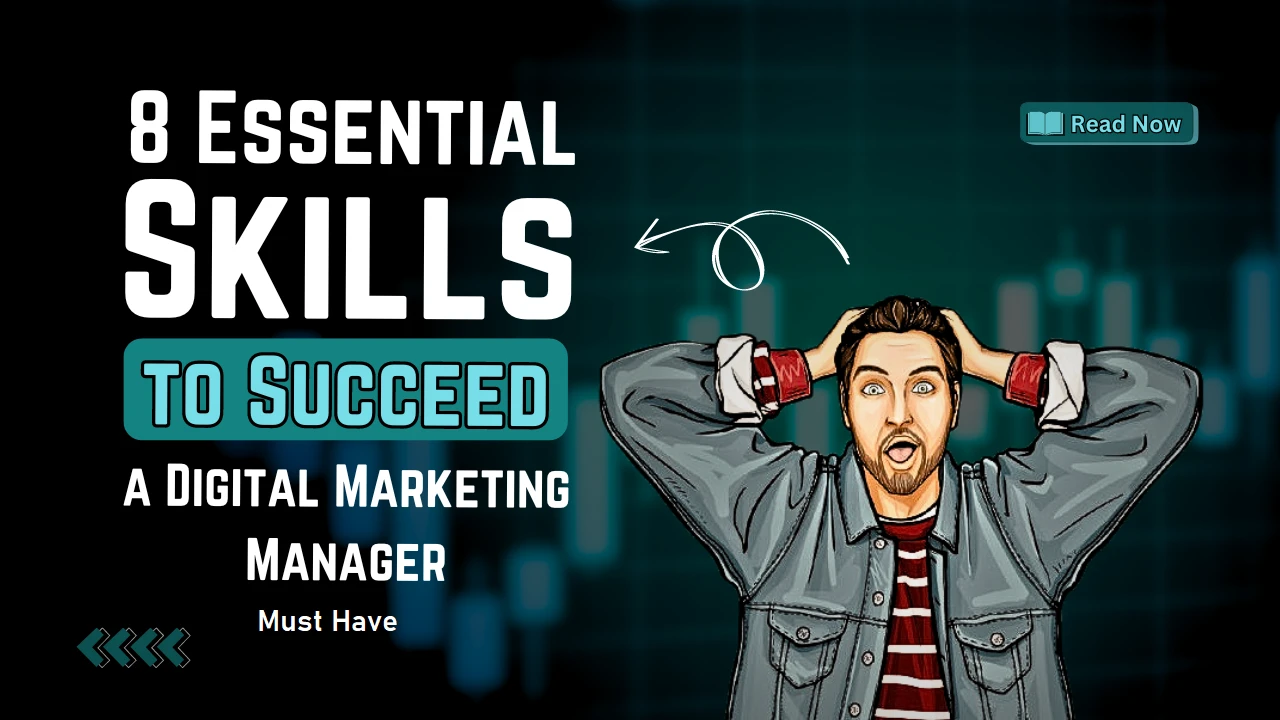8 Skills Every Digital Marketing Manager Should Have

Digital marketing has revolutionized businesses' traditional approaches to reaching out to their audiences. Such innovations have given rise to a great demand for digital marketing professionals, which has, in turn, resulted in companies in the modern world shifting their marketing expenses from traditional to digital.
Numerous recent statistics indicate that while the expenditure for digital marketing is continuously increasing, the amount spent on traditional marketing channels is decreasing.
These changes have led to a consistent growth rate in demand for digital marketing managers, who are also significantly compensated for helping businesses expand.
What is a Digital Marketing Manager?
A digital marketing manager oversees a company's online presence, ensuring that digital channels like websites, social media, email, and search engines are optimized for maximum impact. Their role is centred around enhancing visibility, driving website traffic, and generating leads.
From strategizing campaigns to executing them, digital marketing managers play a vital role in bridging the gap between a brand and its online audience.
The role of a digital marketing manager is to manage the brand's business exposure. This entails optimizing all of the brand's online platforms, such as its website, social media, emails, or PPC campaigns. The manager's primary focus is improving web page visibility with the end goal of generating more leads.
They are the main link between a branding activity and online interaction with its target audience, as they are responsible for designing and executing marketing strategies.
What Does a Digital Marketing Manager Do?
The role of a digital marketing manager is to manage data, allocate funds, and optimize campaigns to ensure a business's strong online presence.
They are responsible for all the activities, such as managing skilled marketing teams with expertise in SEO, content creation, social media marketing, PPC advertising, and E-marketing.
Due to the variety of marketing channels, digital marketing managers must have diverse skills and closely engage with other departments, such as sales and product development.
An essential aspect of their function is to be on the lookout for modern changes in technology strategies to improve their vision.
Tasks of a Digital Marketing Manager
As a digital marketing manager, you wear several hats every day. Some of the more typical duties that are expected of you include the following:
- Creating and executing a digital marketing strategy that includes advertising on social media, email, SEO, PPC, and other forms of marketing.
- Campaigns can be evaluated using Google Analytics and other tools.
- Ad budgets are set and divided appropriately for various ads.
- Working alongside designers, Writers and the marketing team to generate creative content.
- Developing social media and improving the use of inbound information to enhance the website's design and functionality.
- Doing keyword research and deploying SEO tactics.
- Managed social media accounts and analyzed the content produced.
- Tracking KPIs like web traffic, conversion rates, and return on investments.
Essential Skills for a Digital Marketing Manager
Having understood the responsibilities of a digital marketing manager, here are some key skills that one would need to succeed in this role.
1. Strategic Leadership
In a senior role such as a digital marketing manager, IT skills are basic but necessary. This means the ability to mobilize a group of people to perform activities targeted at achieving business goals.
You will have to develop approaches to educate and develop those on your team while also developing your ability to resolve issues as they come up.
Leadership is not only about the people that are under you but also about the marketing practices that fall under your jurisdiction. This entails knowing the customer and their purchase experience, properly distributing marketing money, and speaking directly to clients through ordinary channels, such as digital PR.
This also encompasses other essential tasks like devising and executing a thorough and complete digital marketing plan. This consists of examining the various data, making decisions based on the evidence, and looking for new and original marketing methods that help grow the business. A positive mindset is important for upholding momentum, particularly in difficult circumstances where marketing projects may not produce immediate outcomes.
2. Content Marketing
In numerous marketing efforts, content creation is the primary approach to engaging and reaching customers and potential customers.
Even though this occupation of a digital marketing manager does not involve writing tasks, it does require knowledge of content writing and marketing.
For content to be effective, it has to be structured according to extensive details of customers' characteristics, objectives, and action calls.
Furthermore, content strategies need to be created for the specific platforms. For example, emails tend to be longer and more detailed than social media posts, which are short and direct.
A digital marketing manager advises how to tailor the content for each channel to maximize its effect.
3. Artificial Intelligence (AI)
Due to AI, the face of digital marketing is changing at a more rapid pace, and digital marketing managers must not lag behind. From automation to personalization, customer segmentation, and chatbot integration, AI tools have become a necessity for high productivity and efficiency.
AI tools in standalone capacity also significantly contribute to content exploration, audience targeting and engagement, keyword and phrase identification, and even prediction of future trends and their developments.
Knowing such technologies and what can be done with them is becoming core knowledge for those wanting to build a career as digital marketing managers.
4. Data Analytics
In modern marketing, businesses accumulate large amounts of data from various channels. However, the usefulness of that data can be limited when exported.
An expert in digital marketing should determine the most critical information and insights to optimize the campaigns that will be conducted.
For example, when a company approached a behavioural analysis, it improved its customer journey by increasing the conversion rate on its landing pages. Finding and solving such problems can significantly improve the effectiveness of the campaigns.
5. Search Marketing
Search marketing is a necessary component of effectively marketing a business online. A digital marketing manager should be able to employ both SEO and PPC marketing strategies to boost visibility and attract more potential customers.
Keyword targeting and search intent understanding are key components in customer campaign strategies.
Using TikTok as a search engine replaces the traditional and reinforces the need for search marketing to be flexible and creative.
6. Email Marketing
Although it is considered one of the ancient Means of Marketing, emails are still essential in generating awareness and engagement. Email services allow for deeper customization of campaigns related to interests, behavioural patterns, or demographics.
There is also a positive side to email marketing, as this is a first-party data channel that enables the use of volunteered information to reach the audiences.
As a digital marketing manager, you will create interesting email campaigns that build trust and maintain customers' loyalty.
7. Social Media Marketing
Social media platforms comprise 5 billion users around the globe and thus provide the best exposure by connecting users from all sorts of backgrounds. Different platforms target different levels of society. Young audiences tend to use TikTok, while professionals and B2B users use LinkedIn.
This diversification helps marketers design entertaining strategies and promote ads instead of direct content aimed at specific customers. Social media plays a crucial role in increasing the brand's visibility, increasing customer engagement, and advertising a product or service.
Effective strategies include:
- Social Listening involves using tools like Google Alerts or Social Mention to understand the audience's interests and determine where the trends are moving.
- Retargeting Ads: Attempt to contact users who have already accessed the website or interacted with the brand.
- Customer Service: Respond in real-time to questions and complaints sent via Facebook or X.
- Market Research: Use polls and surveys to obtain feedback, measure tendencies, and analyze competitors.
- User-Generated Content (UGC): Distributing original works created by users to foster credible content engagement.
- Influencer Marketing: Getting influencers on Instagram, Tiktok and other platforms to promote to larger audiences
- Shoppable Posts: Using Instagram or Facebook features allows users to make enquiries directly.
- Crisis Management: Posting timely updates and replying adequately to customers to minimize anxiety during crises.
Social media can be helpful, but for it to be valid, a strategy has to come first for its success.
8. UX and Website Design
According to Top Design Firms, a considerable portion of users (nearly 50%) look at the design to form their impression of a brand. Considering just how rough first impressions can be, a website design plays a crucial impression-shaping role.
Once again, one should not overlook the user experience (UX), which has a big impact on the smoothness of the navigation process.
Online marketing managers must approach the site from the audience and try to provide answers to the following essential aspects:
- Is it hard to find the information needed?
- Is there universal branding for every participant in the channel?
- Is the user flow interrupted unduly by things like too many pop-up windows?
- Are answers to questions readily and provided?
- Is the speed of page loading acceptable?
- Is the website friendly to mobile devices?
Furthermore, incorporating features such as loading pages in a fraction of second, easy-to-navigate menus, and mobile-friendly layouts can help increase interactions and enhance your website's different performance indicators, which in turn will help meet your wider marketing objectives. The role of a digital marketing manager is challenging but full of exciting opportunities. It allows you to lead projects across various marketing channels, making every day dynamic and rewarding.
While the eight skills outlined above are important, do not overlook the importance of soft skills like adaptability, clear communication, and problem-solving. Employers highly value these qualities, which can give you a competitive edge.
To stay ahead in digital marketing, invest in yourself. Keep up with the latest trends, learn new tools, and continue building your skillset. With dedication and the right skills, you can thrive as a digital marketing manager.
Share
Table Of Contents
- What is a Digital Marketing Manager?
- What Does a Digital Marketing Manager Do?
- Tasks of a Digital Marketing Manager
- Essential Skills for a Digital Marketing Manager
